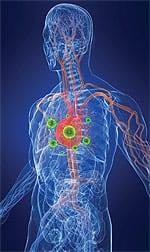Life Extension Magazine®
Cancer cells must communicate with one another in order to infiltrate nearby tissues and to metastasize to distal areas of the body, where they often inflict their lethal effects. Conventional oncology has largely overlooked the critical role that signaling between cancer cells plays in enabling uncontrolled tumor proliferation. As single-target interventions, chemotherapy and radiation kill rapidly dividing normal cells, healthy tissue, and malignant cancer cells indiscriminately. Suppose instead you could disrupt cancer cells’ lines of communication sufficiently to slow and prevent their proliferation, leaving healthy cells untouched? Avant-garde cancer researchers are finding that a proprietary form of citrus pectin possesses this capability. In this article you will learn of the mechanisms by which cancer cells “coordinate” their growth and spread through cell-to-cell signaling. You will find up-to-date scientific data detailing how modified citrus pectin or MCP may act to thwart malignant proliferation and tumor growth, improving prognosis and quality of life in cancer patients. In one notable study, 70% of prostate cancer patients treated for 12 months with MCP experienced significant slow-down in the rise of prostate-specific antigen or PSA concentrations in the blood1—an indicator of improvement in their prognosis! Galectins—Cancer CommunicatorsLiving cells use hormones, cytokines, and other chemical signals to communicate with other cells and send long-distance messages through the bloodstream. Up close, cells use proteins and fat molecules on their surfaces to notify one another of their presence and to provide instructions about how, when, and where to grow. Cancer cells use similar methods to communicate, but their communication networks are corrupt. The signals that cancer cells transmit are for the destruction of normal tissue and may ultimately trigger clusters of cancer cells to migrate and/or metastasize into other tissues—often with lethal effects. Numerous stages of cancer progression involve recognition of specific carbohydrates by cell surface proteins in that corrupt communications network.2 One of these types of cell surface proteins necessary for cancer cells to communicate is called galectins. Recent research reveals that galectins are utilized by malignant tumors3 and that they also act as a sort of molecular “glue,” causing cancer cells to aggregate, or clump together.4,5
When a sufficient number of cancer cells have aggregated or clumped together, some can break off and travel through the bloodstream, setting up footholds in tissues far from the site of the original cancer in the process called metastasis.6,7 Metastatic spread is one of the hallmarks of advanced cancer, and once it occurs, a patient’s chances of survival are sharply reduced. Galectins are involved at each step in aggregation, invasion, and metastasis.5,8-10 Galectins help cancer cells fight off our best chemotherapy, making the cells resistant to apoptosis, or programmed cell death.9 Finally, galectins are emerging as vital players in producing inflammation, often a necessary step in cancer promotion.5,11,12 Given their multiple roles in cancer development, it is clear why galectins have become exciting new targets for drug development.13,14 If we could interfere with galectins on cancer cell surfaces, we would have a powerful means of disrupting their coordinated attacks on our bodies. And indeed, there is tremendous interest in the world of Big Pharma to bring out new anti-galectin drugs.12 As always, though, we can expect that such drugs will be a) expensive, b) slow to reach the market, and c) targeted only at one specific target in the complex array of galectin-based communications. Modified Citrus Pectin (MCP)—Jamming Cancer Communications NaturallyIntact citrus pectin molecules are long-chain, branched polysaccharides made from individual galacturonic acid molecules strung together. Galacturonic acid is the oxidized form of galactose. The galectins that make cancer cells so dangerous act by binding to galactose molecules on one another’s surface membranes. So, by introducing a large number of reduced molecular weight chains of pectin molecules into the body, we can essentially “coat” the galectins with innocuous galactose molecules connected to nothing more dangerous than the pectin used to prepare jelly.15 That coating of modified citrus pectin, in turn, prevents galectins from interacting with one another and helping cancer cells to aggregate, adhere, and metastasize.15,16 Since galectins also provoke expression of the protease enzymes that allow tissue invasion, we can expect that pectin treatment would reduce cancers’ ability to invade tissue as well.17 A proprietary form of modified citrus pectin (MCP) was shown to interrupt and reduce the metastatic process by reducing migration, adhesion, and invasion in both the androgen-independent prostate cancer PC-3 line, and in the aggressive breast cancer triple negative cell line, MDA-MB-231.18 Scientists have recently found that this proprietary form of MCP possesses immune enhancement properties. Specifically, MCP enhances natural killer (NK) cell activation and activity. This is important as it sheds light on the mechanisms of MCP. Not only is the cancer cell being bound to the MCP and presented to the immune system, but the immune system is dramatically enhanced and stimulated by the MCP.19
In 2009 it was shown for the first time that galactose-containing portions of pectin molecules do indeed bind to the human galectin known as galectin-3,20 which regulates cell growth, cell adhesion, cell proliferation, angiogenesis, and apoptosis.9 But naturally occurring, unmodified pectin molecules are bulky and difficult to absorb in the digestive tract, and they prefer to bind to one another rather than to molecules such as galectins. In order for pectin molecules to be biologically useful in our battle against cancer, they have to be modified. Specifically, they need to be reduced in size and complexity, to form shorter-chain, less highly branched molecules that offer multiple sites where their galactose components are available for binding to galectins on cancer cells. A proprietary formulation of modified citrus pectin that is reduced in size is turning the cancer-fighting world upside down.20 MCP is prepared from the pith of citrus peel that would otherwise go to waste.15 MCP production can be accomplished in a “green” fashion, minimizing its carbon footprint even while producing a health-giving end product.21 Citrus fruit has the highest pectin content of most common foods. Its modification by a non-GMO (not genetically modified) enzyme controlled by heat and pH treatment produces relatively short-chain, non-branched pieces of the larger pectin molecule.6 MCP is rich in the galactose-containing sub-units that bind to galectin-3, the primary galectin involved in cancer promotion, adhesion, and metastasis.6,15 Let’s examine the world literature on this remarkable cancer-fighting compound.
MCP’s Multi-targeted Effects on Tumor Growth, Progression, and MetastasisIt has been nearly two decades since the first studies demonstrating that MCP is capable of preventing metastasis in experimentally induced cancers. Mice that had been injected with human melanoma (skin cancer) cells had very high rates of colonization of their lungs with the deadly metastases; that effect was strongly inhibited when the cells were pre-treated with MCP.22 That astonishing result was shown to be caused by binding of tumor galectins by the MCP, which interfered with cell-to-cell recognition. A subsequent study showed that similar treatment also inhibited melanoma cells’ ability to anchor themselves to a growth medium, similar to the way metastatic tumors establish themselves in previously healthy tissue.6 Compelling studies in other animal models have shown similar (and even superior) results. In one case, 15 out of 16 control rats injected with prostate cancer cells developed lung metastases, while only 7 out of 14 given a 0.1% solution of MCP developed lung metastases.16 The animals that did suffer metastases had significantly fewer in the treated than in the control groups. Interestingly, in that early study, the MCP appeared to have no effect on the growth of the primary tumors, a finding that would be challenged as we learned more about MCP.
To illustrate that point, let’s look at a study of human colon cancer cells implanted into mice (a standard human colon cancer model).23 The mice were given MCP in their drinking water at low or high doses. By the 20th day of the study, a significant reduction in tumor size was detected in both groups, compared with control animals. In fact, the low-dose group had an average 38% reduction in tumor size, and an impressive 70% reduction was found in the high-dose group. That was the first demonstration that MCP might actually reduce the size of primary tumors, in addition to its ability to prevent metastases.23 Several more recent studies have now confirmed the powerful anti-metastatic effect of MCP in a variety of common cancers.15,24,25 As scientific interest in MCP increased, so did the level of our detailed understanding of its mechanisms of action (like most nutrients, MCP has more than a single biological target). It was found that tumor growth, angiogenesis (new blood vessel formation), and spontaneous metastases were all significantly reduced by MCP given orally.2 These effects were traced to MCP-related inhibition of galectin-3, the ubiquitous tumor-associated recognition and adhesion molecule. Remarkably, MCP not only inhibits galectin-3 activity directly, but it also inhibits cells’ movement towards the galectin-3.2 That inhibition of so-called chemotaxis (movement toward or away from a stimulus) has profound implications in cancer care; it illustrates how MCP can prevent both local and distant spread of malignant tumors. MCP was also used to challenge a common perception among scientists that tumor embolism (spread of tumor by chunks breaking off and floating through the bloodstream) was the result of the tumor simply lodging in small blood vessels.26 Scientists at the University of Missouri noticed that a significant number of breast and prostate cancer cells slid easily through the tiny capillaries in the lung, failing to lodge there, and instead wound up in other, more distant, tissues.26 That showed that something else was going on to attract the cells to their final destination. By treating the cells with MCP, the researchers found that they could drastically reduce the adhesion of tumor cells to blood vessel lining in those final tissues. That demonstrated the important role of galectin-3 as an adhesion-promoting molecule—and the promise of MCP as an adhesion-preventing, anti-metastatic treatment.
Human studies of MCP have been similarly revealing. Doctors closely monitor men with known prostate cancer following surgery or other treatment, tracking the amount of time it takes for the cancer marker prostate-specific antigen (PSA) to double its concentration in the blood. The shorter the doubling time, the worse the prognosis. Seventy percent of men treated orally with a MCP preparation for 12 months experienced a significant increase in their PSA doubling time.1 As in other human studies, subjects tolerated MCP without side effects. A study of 49 individuals with various solid tumors that were in an advanced stage of progression showed promising results. The study participants consumed 5 grams of modified citrus pectin three times daily for cycles of 4 weeks each. Nearly 21% experienced an overall clinical benefit associated with a stabilization or improvement in quality of life. Eleven patients showed stable disease after two cycles of treatment, and 6 showed stable disease for more than 24 weeks. One patient with metastasized prostate cancer demonstrated a 50% decrease in PSA level following 16 weeks of treatment, along with improved quality of life and decreased pain. The investigators concluded that modified citrus pectin produces positive clinical benefits and improved quality of life in people with advanced solid tumors.27
An important characteristic of MCP is its ability to induce apoptosis in cancer cells. Remember that apoptosis (programmed cell death) is one of nature’s ways of keeping incipient cancers under control. Most early cancers actually die off from apoptosis-inducing death pathways before they ever take hold, but successful cancers manage to suppress those pathways to survive.28 MCP induces apoptosis by blocking galectin-3, which itself has anti-apoptotic functions. By blocking galectin-3, MCP allows nature’s own anticancer mechanism to resume its normal function, and the cancer cells die.13 Recent studies have capitalized on MCP’s apoptosis-inducing features to help increase tumor response to chemotherapy, a vital step in reducing the amount of dangerous chemicals required.7 And an exciting paper was published in 2010, revealing that a formulation of MCP could induce apoptosis in human and mouse prostate cancer cells.29 Scientists are keenly interested in this study, because it showed that MCP could preside at the deaths of both androgen-dependent and androgen-independent prostate cancers. Androgen-dependent cancers can be treated with relatively safe androgen-deprivation therapies, but androgen-independent tumors can be highly resistant to treatment. Thus MCP appears to be an outstanding candidate for suppression of both types of prostate cancers, which are the most common diagnosed cancers in men.15 SummaryCancer cells rely on the ability to communicate with one another in order to invade, colonize, and proliferate in healthy tissue. A proprietary form of citrus pectin has been shown to disrupt this inter-cellular communication, slowing metastasis and improving quality of life in cancer patients. Preliminary studies suggest modified citrus pectin may retard tumor growth, induce selective cell death for specific cancers, and inhibit angiogenesis—the spontaneous growth of blood vessels tumors require to nourish themselves and spread. If you have any questions on the scientific content of this article, please call a Life Extension® Health Advisor at 1-866-864-3027.
| |||||||||||
| References | |||||||||||
| 1. Guess BW, Scholz MC, Strum SB, Lam RY, Johnson HJ, Jennrich RI. Modified citrus pectin (MCP) increases the prostate-specific antigen doubling time in men with prostate cancer: a phase II pilot study. Prostate Cancer Prostatic Dis. 2003;6(4):301-4. 2. Nangia-Makker P, Hogan V, Honjo Y, et al. Inhibition of human cancer cell growth and metastasis in nude mice by oral intake of modified citrus pectin. J Natl Cancer Inst. 2002 Dec 18;94(24):1854-62. 3. Demydenko D, Berest I. Expression of galectin-1 in malignant tumors. Exp Oncol. 2009 Jun;31(2):74-9. 4. Pieters RJ. Inhibition and detection of galectins. Chembiochem. 2006 May;7(5):721-8. 5. Liu FT, Rabinovich GA. Galectins: regulators of acute and chronic inflammation. Ann N Y Acad Sci. 2010 Jan;1183:158-82. 6. Inohara H, Raz A. Effects of natural complex carbohydrate (citrus pectin) on murine melanoma cell properties related to galectin-3 functions. Glycoconj J. 1994 Dec;11(6):527-32. 7. Glinsky VV, Raz A. Modified citrus pectin anti-metastatic properties: one bullet, multiple targets. Carbohydr Res. 2009 Sep 28;344(14):1788-91. 8. Elola MT, Wolfenstein-Todel C, Troncoso MF, Vasta GR, Rabinovich GA. Galectins: matricellular glycan-binding proteins linking cell adhesion, migration, and survival. Cell Mol Life Sci. 2007 Jul;64(13):1679-700. 9. Fukumori T, Kanayama HO, Raz A. The role of galectin-3 in cancer drug resistance. Drug Resist Updat. 2007 Jun;10(3):101-8. 10. Sgambato A, Cittadini A. Inflammation and cancer: a multifaceted link. Eur Rev Med Pharmacol Sci. 2010 Apr;14(4):263-8. 11. Demetter P, Nagy N, Martin B, et al. The galectin family and digestive disease. J Pathol. 2008 May;215(1):1-12. 12. Norling LV, Perretti M, Cooper D. Endogenous galectins and the control of the host inflammatory response. J Endocrinol. 2009 May;201(2):169-84. 13. Johnson KD, Glinskii OV, Mossine VV, et al. Galectin-3 as a potential therapeutic target in tumors arising from malignant endothelia. Neoplasia. 2007 Aug;9(8):662-70. 14. Salatino M, Croci DO, Bianco GA, Ilarregui JM, Toscano MA, Rabinovich GA. Galectin-1 as a potential therapeutic target in autoimmune disorders and cancer. Expert Opin Biol Ther. 2008 Jan;8(1):45-57. 15. Modified citrus pectin-monograph. Altern Med Rev. 2000 Dec;5(6):573-5. 16. Pienta KJ, Naik H, Akhtar A, et al. Inhibition of spontaneous metastasis in a rat prostate cancer model by oral administration of modified citrus pectin. J Natl Cancer Inst. 1995 Mar 1;87(5):348-53. 17. Demers M, Magnaldo T, St-Pierre Y. A novel function for galectin-7: promoting tumorigenesis by up-regulating MMP-9 gene expression. Cancer Res. 2005 Jun 15;65(12):5205-10. 18. Available at: http://www.dreliaz.org/sites/default/files/sliva-synergy-poster-april-2010.pdf. Accessed April 19, 2011. 19. Eliaz I. Integrative approaches to prostate cancer. Presented at: American Academy of Anti-aging Medicine (A4M) Integrative Oncology Fellowship. Boca Raton, FL. March 10, 2011. 20. Gunning AP, Bongaerts RJ, Morris VJ. Recognition of galactan components of pectin by galectin-3. FASEB J. 2009 Feb;23(2):415-24. 21. Zykwinska A, Boiffard MH, Kontkanen H, Buchert J, Thibault JF, Bonnin E. Extraction of green labeled pectins and pectic oligosaccharides from plant byproducts. J Agric Food Chem. 2008 Oct 8;56(19):8926-35. 22. Platt D, Raz A. Modulation of the lung colonization of B16-F1 melanoma cells by citrus pectin. J Natl Cancer Inst. 1992 Mar 18;84(6):438-42. 23. Hayashi A, Gillen AC, Lott JR. Effects of daily oral administration of quercetin chalcone and modified citrus pectin on implanted colon-25 tumor growth in Balb-c mice. Altern Med Rev. 2000 Dec;5(6):546-52. 24. Liu HY, Huang ZL, Yang GH, Lu WQ, Yu NR. Inhibitory effect of modified citrus pectin on liver metastases in a mouse colon cancer model. World J Gastroenterol. 2008 Dec 28;14(48):7386-91. 25. Huang ZL, Liu HY. Expression of galectin-3 in liver metastasis of colon cancer and the inhibitory effect of modified citrus pectin. Nan Fang Yi Ke Da Xue Xue Bao. 2008 Aug;28(8):1358-61. 26. Glinskii OV, Huxley VH, Glinsky GV, Pienta KJ, Raz A, Glinsky VV. Mechanical entrapment is insufficient and intercellular adhesion is essential for metastatic cell arrest in distant organs. Neoplasia. 2005 May;7(5):522-7. 27. Azemar M, Hildenbrand B, Haering B, Heim ME, Unger C. Clinical benefit in patients with advanced solid tumors treated with modified citrus pectin: a prospective pilot study. Clinical Medicine: Oncology. 2007;1:73–80. 28. Wiezorek J, Holland P, Graves J. Death receptor agonists as a targeted therapy for cancer. Clin Cancer Res. 2010 Mar 15;16(6):1701-8. 29. Yan J, Katz A. PectaSol-C modified citrus pectin induces apoptosis and inhibition of proliferation in human and mouse androgen-dependent and- independent prostate cancer cells. Integr Cancer Ther. 2010 Jun;9(2):197-203. 30. Kolatsi-Joannou M, Price KL, Winyard PJ, Long DA. Modified citrus pectin reduces galectin-3 expression and disease severity in experimental acute kidney injury. PLoS One. 2011 Apr 8;6(4):e18683. |







